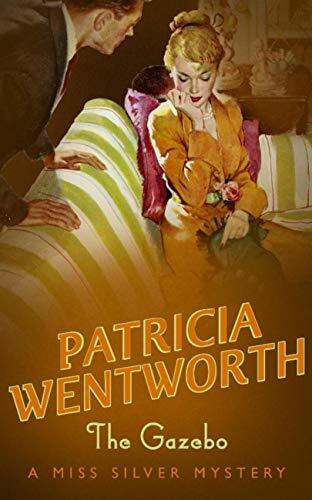The Gazebo

A review of The Gazebo by Patricia Wentworth – 240706
The twenty-seventh novel in Patricia Wentworth’s Miss Silver series, originally published in 1955 and with an alternative title of The Summerhouse, is an interesting if somewhat low-key study into the ways of provincial life and has an almost timeless feel about it. Aside from the reality of the murder of Althea Graham’s manipulative and deeply unpleasant aunt, Mrs Graham, the plot would not be out of place in a Victorian melodramatic novel.
Althea had fallen in love with Nicholas Carey but her aunt vetoed their engagement five years ago and Carey went off travelling. On his return their love was rekindled and they decided to marry without the aunt’s approval. However, Mrs Graham after overhearing their plans confronted them in the gazebo in the grounds of Grove Hill, there was an argument and Althea led her back to the house and put her to bed. Later that night Mrs Graham got up again, went to the gazebo again, was overheard mentioning Nicholas’ name and is found dead the following morning, having been strangled.
The obvious suspect is Nicholas, especially as, according to the Yard detective Frank Abbott, his time amongst the savages of Africa could have affected his behavioural values. Althea, though, has had the sense to invite Miss Silver to protect her interests and the knitting sleuth is more than a little interested in the history of Grove Hill, which was burnt down during the Gordon Riots, immortalized in Dickens’ Barnaby Rudge, and why two rather unsavoury characters, Blount and Worple are bidding against each other and willing to buy the house at more than the market value.
It does not take a genius to work out that there is something of considerable value is buried in the grounds and rather than being the victim of a vengeful lover, Mrs Graham might just have been in the wrong place at the wrong time. Miss Silver makes it her mission to uncover the truth and dissuade her favourite detective, Frank Abbott, from making a monumental mistake.
Wentworth fills her village with some wonderful characters, not least the Pimms’ sisters, three spinsters whose life work is to be the medium through which all the village’s tittle tattle passes. The middle sister, Lily, has the useful knacks of being acutely observant, recognizing that the volatile Mrs Harrison had lost a stone from her ring on the night of Mrs Graham’s murder, a stone which, of course Miss Silver finds in the gazebo, and an unerring ability to recall conversations verbatim, a skill which is less helpful to Nicholas’ cause. Several of the villagers in their different ways attempt to put two and two together to solve the mystery.
There are also some awful characters, Mrs Harrison who throws valuable antiques at her rather unworldly husband, Mr Blount who leads his nervous wreck of a wife a dog’s life, and Mrs Graham who uses ill-health to reduce her niece to little more than an unpaid domestic help, squeezing all the vitality out of her. That is why the return of Nicholas was so welcome and the suspicions over his actions were so hurtful.
Anyone who has lived in a village will recognize that there is a deep divide between those who were born and bred there and the newcomers, the latter being viewed with deep suspicion by the former. Even Nicholas loses his native status for having the temerity to break away for five years. Wentworth captures this aspect of life to a T in a novel which, but for the occasional gripe at the level of taxation, shows little evidence of having been set in a country reconstructing itself from the ravages of war. It was also interesting to see two hen-pecked spouses get their own back, adding to overall sense of the restoration of natural justice at the end with each of the main protagonists getting their just desserts.
A tad over long it may be and with a rather thin plot, nevertheless Wentworth knows how to write an engaging and entertaining story. Miss Silver and Frank Abbott in their different ways, naturally, come up trumps again.



